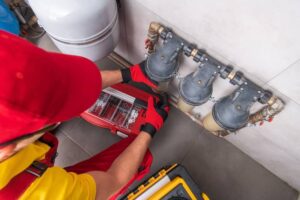Keeping your pool heater in top shape is crucial, not only for extending the swimming season but also for ensuring your pool water is always welcoming and for enhancing energy efficiency. Over time, various signs might suggest that a pool heater replacement is on the horizon. Are you noticing uneven heating or rising pool heater costs? Maybe it’s time to consider whether your old pool heat pump or gas heater has served its full term.
In this blog, we’ll explore the critical indicators that signal the need for a new unit, helping you decide when to make the switch. Let’s start.
Table of Contents
ToggleRecognizing the Signs of a Failing Pool Heater
If your pool’s warm refuge is turning chilly or inconsistent, it might be time to check on your pool heater. Let’s dive into the signs that indicate your heater might be calling it quits, ensuring you’re never left in the cold. Rising maintenance costs can also be a clear indicator of the need for a pool heater replacement.
Age of the Gas Pool Heater
The average lifespan of pool heaters can vary, but typical heat pumps or gas heaters should serve you well for 10 to 15 years. As they age, their efficiency can decline, struggling to heat your swimming pool effectively. If your pool heater is older than a decade, it might be time to consider a pool heater replacement, especially if you’re eyeing more energy-efficient options like a solar pool heater. Replacing an old pool heater can lead to lifespan extension of the pool heating system overall.
Increased Energy Bills

Have you noticed your energy bills creeping up? An old or malfunctioning pool heater can consume more energy to deliver less heat. This inefficiency is a clear signal that your electric or gas pool heaters might need a replacement, potentially with a newer, energy-efficient model or energy-saving models that keep running costs lower over time.
Inconsistent Heating and Performance
A failing heater often shows signs of inconsistent heating. Here are some red flags:
- The heater frequently shuts off or won’t shut off, indicating issues with its thermostat or internal controls.
- Error codes on the display can signal various internal problems.
- If your heater emits dark exhaust or makes an unusual sound, it’s a sign of improper combustion or mechanical failure.
- Are you struggling to reach the pool’s desired temperature? This could indicate that the heater’s capacity to regulate heat is compromised.
- Issues with cycling on and off too often also suggest a deeper malfunction.
Opting for a new pool heater with enhanced reliability can significantly mitigate issues of inconsistent heating and performance, ensuring your swimming comfort is never compromised.
Frequent Repairs
When your pool heater starts needing frequent repairs, it’s time to evaluate the costs. If the repair expenses are more than 50% of the cost of a new unit, then replacing your pool heater becomes the more sensible and economical option.
Remember, continual repairs can be a band-aid for a problem that demands a more permanent solution, like a pool heater replacement. Considering warranty coverage can be a decisive factor in choosing a new pool heater to avoid frequent repairs.
The Best Time to Replace Your Solar Pool Heater: Cost Considerations
Deciding to replace a pool heater isn’t just about the what and the why; it’s also about the when. Timing your replacement strategically can save you money and hassle, ensuring you’re ready for the next dip without a hitch.
Off-Season Replacement Benefits
One of the smartest moves you can make is to schedule your pool heater replacement during the off-season. Why? During these cooler months, demand for pool heating services drops, which can translate to lower installation costs and quicker service. Plus, replacing your electric pool heaters and solar pool heaters or solar heaters during the off-season means you won’t miss a single swim when it’s warm.
Planning Ahead for Replacement
Preparing ahead for your pool heater replacement ensures a smooth transition. Start by assessing your current heater type—whether it’s natural gas, electric, or solar—and consider the setup, including gas lines and electrical connections. By organizing the replacement in advance, you can avoid the inconvenience of pool downtime, making sure your swimming pool is swim-ready just in time for the season.
Professional Swimming Pool Heater Installation and Its Benefits
Opting for a professional to handle your pool heater replacement isn’t just the safest choice—it’s also the most efficient. Experts ensure that your new electric pool heater or other types of heaters are installed correctly, saving you from future headaches and expenses, while also optimizing installation costs.
Why Professional Installation?
Professional installation is crucial for pool heating systems, particularly when dealing with complex components like electric heaters or gas lines. Professionals ensure that everything is up to code, which is not just about compliance—it’s about ensuring your safety and optimizing the efficiency of your new unit. This meticulous approach helps in reducing your overall pool heater cost in the long run. Adhering to safety standards during installation is essential for ensuring that all components function safely and efficiently, further safeguarding your investment.
What to Expect During Installation
When you decide to replace your pool heater, anticipate a streamlined process from start to finish. A certified technician will typically assess your current setup, remove the old unit, and install the new electric heater or alternative model. They handle everything from connecting gas lines to setting up electrical connections, ensuring your system runs smoothly. You’ll be briefed on the operation and maintenance of your new heater, which means you can dive back into your warm pool without missing a beat.
Engage Only with Trusted Professionals for Pool Heater Replacement

As we’ve explored, recognizing the signs that it’s time for a pool heater replacement is just the first step. Uneven heating, rising energy bills, and frequent repairs are clear indicators that you might need a new unit. Once you spot these signs, the next step is crucial: consulting with a professional.
Choosing a trusted professional, like those at Professional Aquatic Services, ensures your pool heater replacement is not only performed safely but also efficiently. These experts will assess your current setup and guide you through the selection and installation of the ideal pool heater, making it the only option for guaranteed peace of mind and optimal pool enjoyment.

